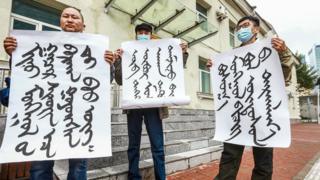 Image copyright AFP
Image copyright AFPEthnic Mongolians in northern China have staged rare rallies against measures to reduce teaching in the Mongolian language in favour of Chinese.
As schools began a new term on Tuesday some parents held children back in protest at the policy.
Under the rules, three subjects in Inner Mongolia will gradually be taught in Mandarin, China’s official language.
Many ethnic Mongolians view the move as a threat to their cultural identity.
Large crowds of students and parents were seen protesting against the change in demonstrations that broke out over the weekend across several cities.
“Our language is Mongolian, and our homeland is Mongolia forever! Our mother tongue is Mongolian, and we will die for our mother tongue!” shouted students at one recent protest, reported Radio Free Asia, a US government-funded broadcaster.
Images of women applying their fingerprints or adding their signatures to petitions against the move were also widely circulated on social media.
‘Suppressing Mongolian language’
Starting this month, according to the new policy, schools would gradually shift the language of instruction in three subjects – politics, history, and language and literature – from Mongolian to Mandarin across China’s Inner Mongolian Autonomous Region, home to an ethnic Mongol minority.
The Southern Mongolian Human Rights Information Center, a New York-based activist group, described angry scenes across the region as many parents only learned about the shift in policy as schools were set to reopen.
It said there was a tense confrontation at one boarding school as hundreds of parents demanded the release of their children, who had returned early.
“Hundreds of riot police poured to the scene, preventing the parents from accessing the school dormitories. Following hours of standoff, parents finally broke through the police barricade and proceeded to pick up their children,” the group said in a statement.
Authorities have warned people in Inner Mongolia against speaking out on social media. Posts on the subject on Weibo, China’s Twitter-like platform, have been removed.
But concerns over the directive are still running high with some parents keeping students at home.
On Tuesday staff at a school in Naiman county told the BBC that only around 40 students had registered for the semester in place of the usual 1,000. Some subsequently changed their minds, and only some 10 remained.
They said teachers had been sent out for family visits to convince parents to send their children back to school. But that parents were worried the language change would harm the future of their own language.
Critics say the Chinese government has been accelerating its push to assimilate minorities despite coming under widespread international criticism for its treatment of minority groups including the mostly Muslim Uighurs in western Xinjiang.
In a statement published on Friday in an apparent response to growing discontent about the new language policy, the regional authority in Inner Mongolia referenced the importance of “strengthening national language education in ethnic areas”.
The new directive has also seen some people protest in the capital of neighbouring Mongolia on Tuesday while others expressed their fears for the region from exile.
Speaking to the BBC from Germany, Temtsiltu Shobtsood, chairman of the Inner Mongolian People’s Party, an exile group, accused China of “trying to suppress” the Mongolian language.
“The whole world is talking about human rights, but we are not visible enough,” he said, adding that the imposition of Mandarin and the majority Han Chinese culture on minorities in Inner Mongolia was a form of “cultural genocide”.
Click Here to Visit Orignal Source of Article https://www.bbc.co.uk/news/world-asia-china-53981100


